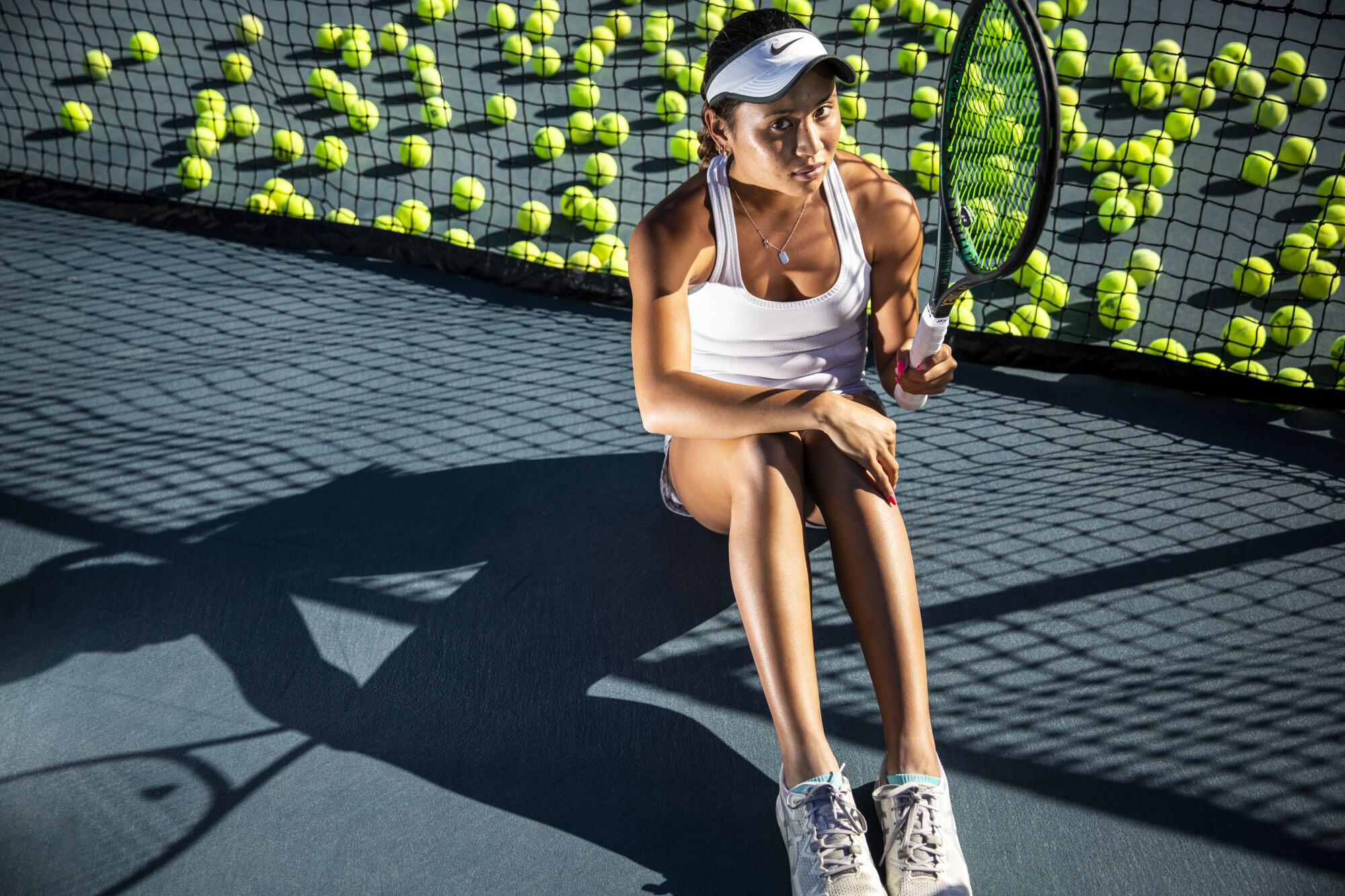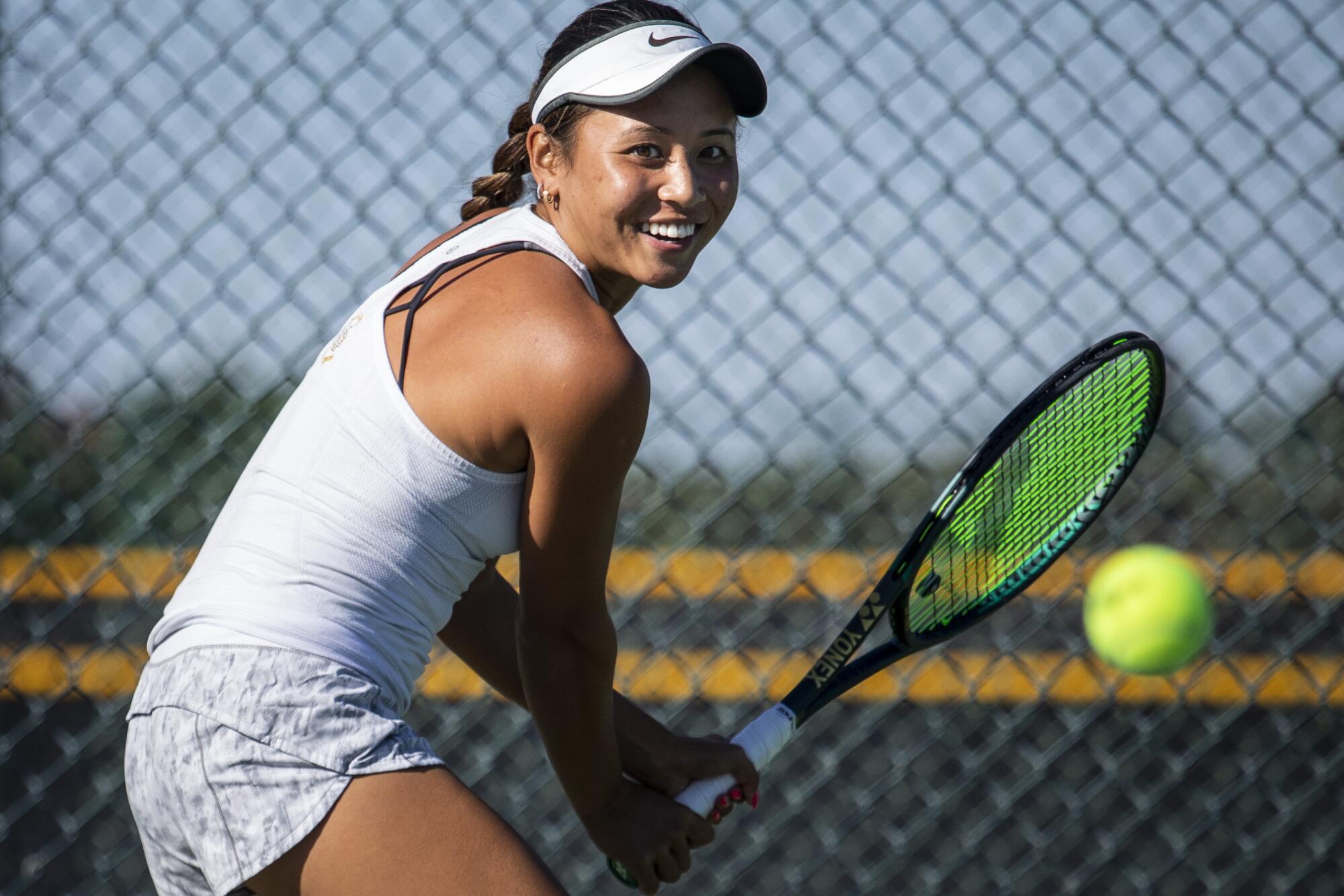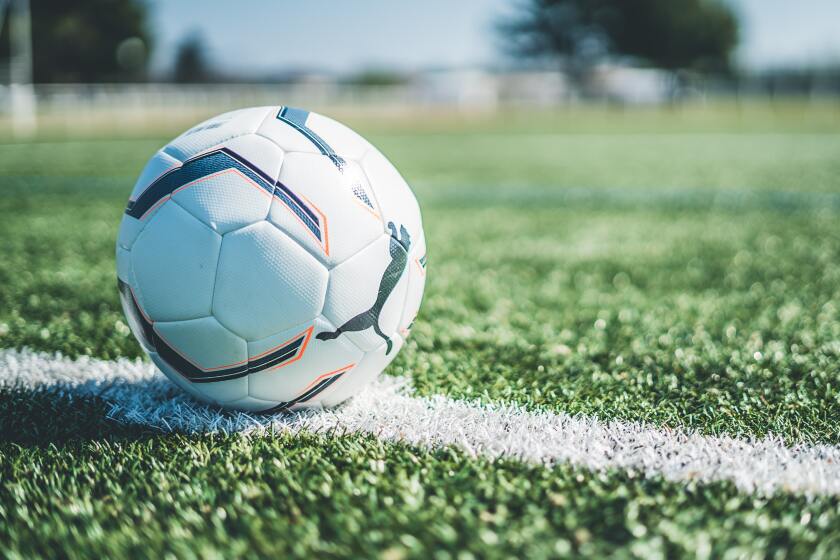
- Share via
Nhusuong Hoang calls it the “angry face.”
Her husband Tom Huynh would tense every time he watched their daughter Haily Huynh play in a tennis tournament. If she lost, he’d go silent with anger. Car rides home would turn into cold wars until the atmosphere exploded and Haily would cry as the two argued back and forth.
“I went through so many years like, ‘Oh, my god, this is torturing,’” Hoang said. “Every time she lost, he couldn’t take it. He just couldn’t take it. And it makes her feel horrible.”
There were plenty of times Hoang pleaded with her husband to take it easy on Haily, who is now the captain of the Mira Costa High girls’ tennis team, thinking her daughter would quit. But father and daughter would always bounce back and head to the courts together to restart the dance, over and over again.
Huynh watches volleys off his daughter’s racket with the same eyes that grew up in a war-torn Vietnam. That saw trucks shuttling across the main road that carried coffins upon coffins. That saw the inside of a refugee camp for a year.
With bits and pieces gleaned at the dinner table, Haily has put together a patchwork of her parents’ history, both immigrants from Vietnam. A senior now, Haily understands her dad’s desire for her and sister Maily, who also plays for Mira Costa, to never experience that kind of poverty. Now, with a scholarship to UC Irvine, Haily hopes she’s made him proud.
“I just spent so much time and effort and he dedicated so much time and effort into me that I wanted to pay him back in that kind of way,” Haily said.
::
Haily still has a piece of paper from when she was a fifth-grader. On that paper is scribbled, “I want to get a scholarship for tennis.”
She doesn’t remember having those thoughts that far back. She didn’t like tennis the first few years she played it. Tennis was her dad’s dream before it was hers.
Huynh bought his first wooden racket at a flea market in Escondido when he was 13 years old, working odd jobs to pay for lessons because tennis was expensive. He went on to have a standout career at Escondido High, but wasn’t quite good enough to play in college.
“I wanted to prove to him that I could do it,” Haily said. “I wanted to make his dream come true.”

Since she was 5, Huynh has driven his daughter to the courts most every day to practice for two hours. Over the years, the sport knit them together so tightly that Haily calls him her best friend.
To this day, she’s never had another personal coach besides her dad.
“You go through enough relationships between parents and kids, and it’s pretty unusual to have this long of a parent-child coaching relationship,” said Allen Yap, Mira Costa’s head coach and Huynh’s old doubles partner.
But there are two Tom Huynhs, in Haily’s mind. There’s her loving dad, and there’s the coach that would get mad at her after every loss — a love-hate relationship, as she put it. He’d refuse to talk to her after she lost a match.
It’s been extremely hard, Huynh said, to be both her coach and her dad. But it’s always been his goal for Haily to get a scholarship.
“In life, you want to be good at something,” Huynh said. “In a way, she probably thinks I pushed her too hard. But at the same time, I push myself hard too.”
::
Huynh attended Catholic school in Vietnam. When one of the nuns knocked on the door to pull another student out of class, he knew that meant one of his classmate’s family members had died.
Born into a South Vietnamese family six years before the fall of Saigon in 1975, Huynh watched as his father was imprisoned after the war and his mother sold all of their possessions to buy food. A few years later, his mother told 11-year-old Huynh and his brothers to get on a boat out of Vietnam and gave him a gold necklace, urging him to sell it and buy food once he reached the United States. But pirates raided the boat and snatched the jewelry from around his neck.
When the boat reached a refugee camp in Malaysia, Huynh had nothing. He stayed there for a year before eventually being sponsored by a Lutheran church to immigrate to the U.S.
“I never want my kids to even remotely experience the things that I did — I call that the refugee mentality,” Huynh said. “I want them to be in a place away from that, as far as possible. Be successful.”
A scholarship for Haily has always been the goal. And Huynh and Hoang, who also immigrated to the U.S. from Vietnam when she was 12, often try to remind their kids of how little they once had.
For years, Haily wanted to quit playing tennis. She credits her dad for pushing her to continue. But as she grew up to find more love in the sport and understand about her family’s past, her dad’s collegiate hope for Haily became her own — one she chased with a burning passion.
“I think about it every day, that my parents sacrificed a lot,” Haily said. “I wanted to give back to them.”
Through all the shouting matches and a house clouded with tension after tournaments, she had an uncanny endurance, Hoang said. And eventually, her mother realized that Haily was following this path not just because her father was pushing her down it.
“Sometimes, I say [to her], ‘What is it? What is your goal? Do you want to get a scholarship or do you just want to play for the love of the sport?’” Hoang said. “I want Haily to really decide for herself. … I said, ‘Do you actually like to play tennis? Do you want to play college?’ And she says, ‘Yeah.’”
::
As much pressure as Huynh put on her when she was starting to play tennis, Haily is her own harshest critic now. Her social life, at times, has taken a backseat to weekend tournaments and practices. She’d go to school, play tennis and go home.
At Mira Costa, Haily is adored. The position of team captain was created this year for the first time, solely for her.
“It takes a special person to want to be a part of a team in an inherently individualistic sport,” Yap said.
Yet, behind the steadfast leadership, Haily has struggled with performance anxiety. In April of her junior year — peak college recruiting season — she lost five matches in a row. Acutely aware of her rankings, she’d cry every day. Her dad, of course, would tell her colleges wouldn’t want her if she kept losing.
“I was at my lowest point for sure in that month, but I kept on trying,” Haily said. “I told myself, ‘I’m not going to look at the rankings anymore.’”
In that three-month break from checking rankings, she played freely — her “best tennis,” as she described. Recruiters came calling. UC Irvine was always her dream school, and when the coach made her a scholarship offer, she described it as the “happiest moment of her life,” her dad said.
Get our high school sports newsletter
Prep Rally is devoted to the SoCal high school sports experience, bringing you scores, stories and a behind-the-scenes look at what makes prep sports so popular.
You may occasionally receive promotional content from the Los Angeles Times.
For Huynh, it was the culmination of a childhood journey.
“That just put the stamp on, ‘Oh, my god, my kid’s going to play college,’” Hoang said, saying of her husband, “For immigrants like him — for immigrants like us — it’s like, ‘Wow.’”
Now, with Haily’s dream scholarship in hand, Yap and Huynh have talked this season about solely focusing on her playing without burden. So far, she’s been “destroying people,” her coach put it, spearheading the team to an 8-2-3 record thus far.
The dream that Haily and her father have been working toward for much of their lives is complete. And now, the pressure’s off. She’s gotten better with her mental game, Hoang observed, and Huynh is learning how to let go and accept that she won’t win every match.
In particular, Hoang said, he doesn’t see the angry face anymore.
More to Read
Get our high school sports newsletter
Prep Rally is devoted to the SoCal high school sports experience, bringing you scores, stories and a behind-the-scenes look at what makes prep sports so popular.
You may occasionally receive promotional content from the Los Angeles Times.






